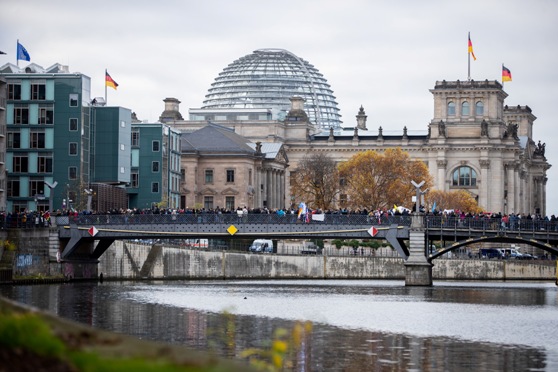German MPs vote to boost pandemic powers amid huge protests, clashes
By Rachel More and Andreas Rabenstein
BERLIN – Police used water cannon to break up a large demonstration on Wednesday (18) not far from the German Parliament, as lawmakers passed legislative amendments boosting government powers in the pandemic.
The Interior Ministry had banned rallies from taking place outside the Reichstag Parliament building and in the surrounding government district, but several thousand people gathered on the edges of the cordoned-off area.
Police ordered a protest at the landmark Brandenburg Gate, not far from Parliament, to disperse at around midday because participants were not keeping the required distance or wearing masks. They then deployed water cannon, although not at full force, after the police order was ignored.
Hours later, police were still spraying water on the crowd, which was moving away only slowly towards the nearby Potsdamer Platz. Many people were drenched and some had red, inflamed eyes from pepper spray used by police.
Officers responded in kind after they were attacked with pepper spray by demonstrators, the German capital’s police force wrote on Twitter. Protesters also lobbed bottles, stones and firecrackers at police.
The number of people detained in connection with the protests has reached triple digits, also taking into account brief detentions, a police spokeswoman said. A rundown of the police operation, including exact numbers on arrests, is not expected until Thursday (19).
The spokeswoman described the demonstrators as “absolutely stubborn,” but said the clearance was going ahead “in a slow, not militaristic manner,” adding that children were also in the crowd.
Up to 2,200 police officers had been deployed in the German capital on Wednesday to shield the government district and enforce social-distancing and mask rules.
German lawmakers voted by a majority to amend legislation that will strengthen the government’s ability to issue restrictions by decree in response to the pandemic.
The bill, put forward by Chancellor Angela Merkel’s coalition government, passed by 415 votes to 236, with eight abstentions.
Merkel’s government hopes that the amended legislation will protect anti-viral measures, such as business closures, contact restrictions and mask rules, from being challenged in the country’s courts.
The Bundesrat upper house is holding a special meeting also on Wednesday to decide on the matter, with President Frank-Walter Steinmeier possibly signing off on the amended legislation that same day.
Some opposition parties have responded to the expedited process with criticism and voiced concerns about citizens’ fundamental rights.
During the Bundestag debate on the coalition’s bill, Health Minister Jens Spahn defended his government’s response to the coronavirus pandemic and appealed for public trust.
“There will be no compulsory vaccination in this pandemic,” he vowed, addressing a key issue among the protesters.
His speech was briefly interrupted when members of the far-right Alternative for Germany (AfD) flouted parliament rules by holding up posters, which decried November 18, 2020, as the day Basic Law – the German constitution – died.
There are concerns about right-wing extremist elements within the German movement to oppose coronavirus restrictions and downplay the pandemic.
In late August, far-right protesters broke away from a larger demonstration against coronavirus measures and attempted to storm the Reichstag.
Hard-line critics of the legislative changes, which will also require decreed orders to have a four-week expiry date unless prolonged, have compared the draft amendment to the Enabling Act of 1933, which weakened German parliament and laid the groundwork for the Nazi dictatorship.
This is not the first time that anti-government coronavirus protesters have drawn on wartime imagery.
At a weekend demonstration in the south-western city of Karlsruhe, an 11-year-old girl compared her life under partial lockdown to that of Anne Frank’s during World War II, prompting an outcry.
Germany is currently in a second shutdown phase aimed at halting the spread of coronavirus, which includes the closure of bars and restaurants as well as limits on group meetings.
The Robert Koch Institute for disease control reported on Wednesday a total confirmed caseload so far of 833,307, with 13,119 deaths from COVID-19.
-dpa


